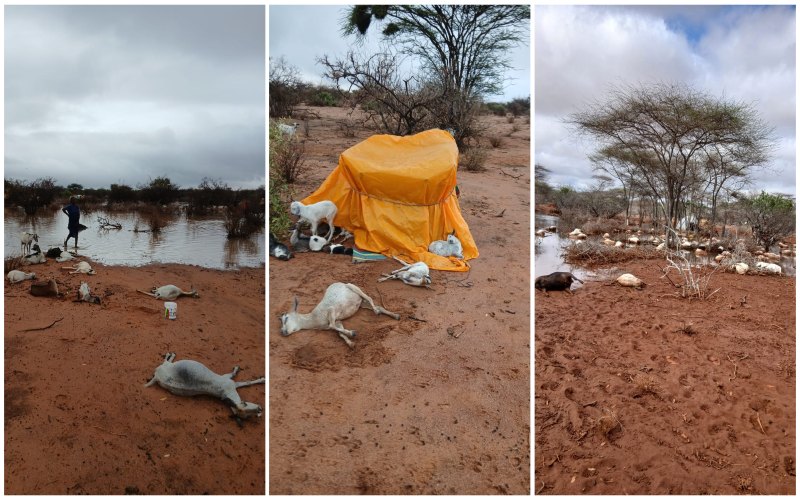A sudden deluge of rain has struck a heavy blow to pastoral communities in northern Kenya, with at least 500 goats and sheep found dead in the aftermath of a violent storm in Balambala Sub-County.
According to residents in the villages of Shimbirey, Saka and Gutoy, the storm arrived without warning on Wednesday night: a deafening crack rumbled through the sky over sunset, followed by torrential downpour that transformed grazing lands into death zones.
For the widowed mother of eight, Halima Aden, the calamity was devastating. She discovered 223 of her goats and sheep lifeless on the muddy ground — her entire herd wiped out. “I thought the rain would save us. But it took away everything,” she said. Another herder, 80-year-old Ahmed Fetin, lost 250 animals.
Even those that survived were found shivering at dawn, too weak to stand. “My lively goats that were in a fenced boma were all carcasses; only a few survived,” he recounted. A third herder saw 50 animals perish — and his collapsible Somali hut swept away by the floodwaters.
Herder Livelihoods Shattered.
In this arid landscape, livestock are far more than animals — they are the bedrock of survival. Losing hundreds of goats and sheep overnight means losing savings, sustenance, and stability. As former Sankuri Ward assembly member Abdi Suleiman put it: “These animals were their bank, their food, their life.”
Climate Signals Growing Danger.
While the rains were initially welcomed after a prolonged drought, experts say the extreme and sudden nature of the downpour — followed by flash flooding — is emblematic of what happens in regions where climate change is altering weather patterns dramatically. The terrain of Garissa County has long been exposed to alternating dry spells and flooding, making pastoralists uniquely vulnerable.
Urgent Call for Support.
Local leaders and communities are urgently appealing for assistance. With homes destroyed, herds decimated and families left stranded, the need for food, fodder, shelter and counselling is pressing.
Neighbouring herders and well-wishers have begun delivering water and meals — but the scale of the loss demands coordinated relief. The County is now being urged to mobilise national and humanitarian aid immediately.












Leave a Reply